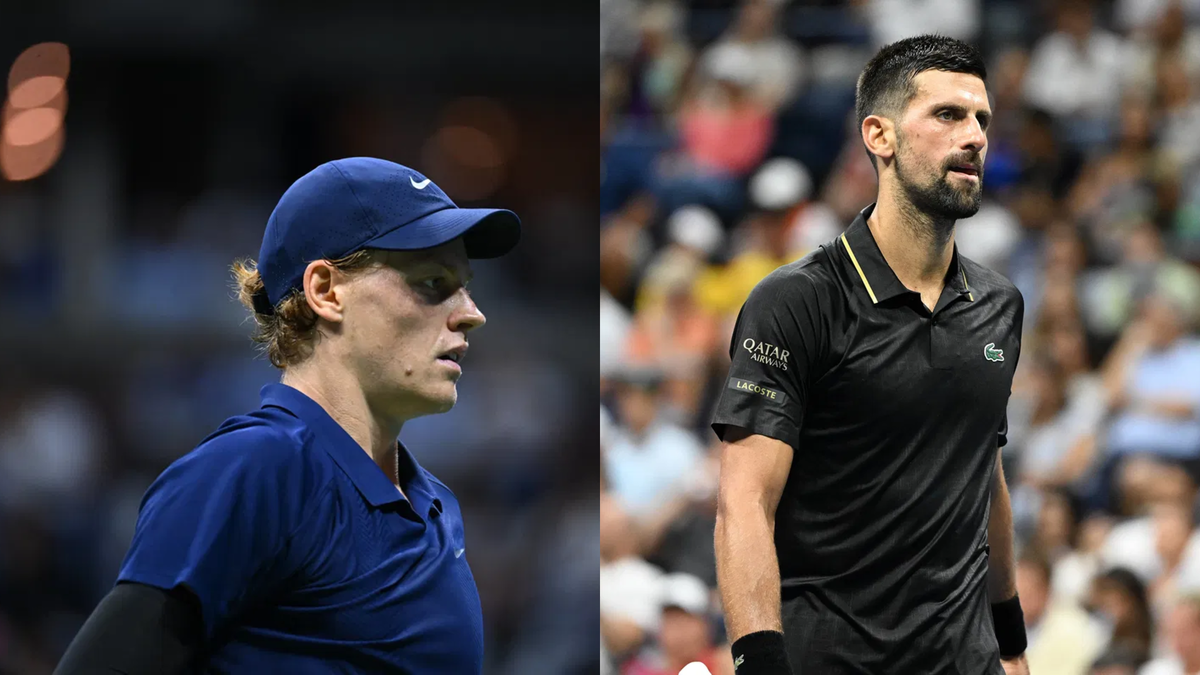
Imago
Image credit: imago

Imago
Image credit: imago
“I’m very disappointed to announce that I won’t be able to play the Rolex Shanghai Masters this year!” said Carlos Alcaraz just a week after winning the Japan Open. His withdrawal, born out of injury and the crushing toll of relentless scheduling, became the sign of a deeper crisis. Now Jannik Sinner has followed suit, while Novak Djokovic visibly battled the punishing conditions, stomach churning under the unbearable heat. With stars falling victim to exhaustion and chaos, the Shanghai Masters has become the flash point of a scheduling storm, sparking fierce backlash.
Watch What’s Trending Now!
Jannik Sinner’s bid to defend his Rolex Shanghai Masters crown ended in cruel fashion on Sunday evening. The Italian succumbed to cramps during the deciding set of his third-round clash with Tallon Griekspoor. Griekspoor led Sinner 6-7(3), 7-5, 3-2 when the No. 2 succumbed to the brutal humidity in Shanghai.
Moreover, the Italian was visibly battling cramp in his right thigh. Sinner limped between points, frantically iced his neck, and repeatedly massaged his thigh. He even rested his legs on the bench during the 2-1 changeover in a desperate effort to stave off the cramp. The fight was valiant, but the body refused to cooperate.
Meanwhile, Novak Djokovic endured his own night of peril at the Shanghai Masters. The 38-year-old battled both illness and inspired opposition to defeat German qualifier Yannick Hanfmann 4-6, 7-5, 6-3. Djokovic stumbled early, falling victim to Hanfmann’s booming serve and varied shot-making, including four consecutive aces in the first set. The second set brought additional challenges, with Djokovic appearing to vomit during a changeover, forcing him to shorten points and conserve energy.
The video of the physio helping Jannik Sinner walk to his chair before retiring from the match in Shanghai.
Really tough scenes to watch.
Come back stronger. ❤️🩹
pic.twitter.com/JqrLYNDQ5M— The Tennis Letter (@TheTennisLetter) October 5, 2025
“The same for every player out on the court, but it’s brutal,” Djokovic admitted. “It’s brutal when you have over 80 per cent of humidity day after day, particularly for the guys when they’re playing during the day with heat, with sun, it’s even more brutal.” His words underscored the physical torment endured by top players during the Asian swing, a stretch notorious for punishing conditions.
Sinner’s forced exit and Novak Djokovic’s suffering are emblematic of the endurance required to survive under the punishing heat and humidity. Even elite players are finding themselves tested to the brink. And as fans witness these struggles, frustration is mounting over tournament scheduling and the punishing Asian swing.
Fans slam ATP schedule after Novak Djokovic and other players suffer in heat
Novak Djokovic’s struggles amplified the backlash. A fan captured the moment he appeared to vomit on court due to brutal heat and humidity, remarking, “The image of Djokovic VOMITING on the court today due to the brutal humidity and heat conditions in Shanghai. Incredible that we have to reach this point. (Translated from Spanish)” Another fan blamed the tour: “I’ve been saying it for a long time, friend… money and interests are killing tennis… neither is anything being done nor is there any desire,” with another adding, “ATP should be ashamed they are killing players.”
Giovanni Mpetshi Perricard also spoke about the conditions in China during his post-match press conference. Although he defeated Taylor Fritz, he thought he was ‘dying on the court’ due to the tormented conditions. Temperatures in Shanghai reached up to 95°F, and with around 55-60% humidity, it’s a hot oven for players who take to the court.
As clips of laboring players at the Shanghai Masters flooded social media, fans wasted no time criticizing the brutal scheduling on the tour. Tennis Latter shared a clip of Jannik Sinner, visibly unable to walk, as a physio helped him to his chair before retiring. One fan commented, “Jannik Sinner’s repeated injuries stem from the ATP tour’s grueling schedule, with no true off-season, constant global travel, and immense physical demands on his body,” while another added, “Tennis is incredibly physical these days, brutal matches played in brutal conditions. Ngl though, I do miss the finesse and guile that was more prevalent in the game in the 70s/80s/90s. Shorter points, now it really is a baseline slugfest in most tournaments. Has to play a part.”
The Asian swing has magnified these struggles. At the recent China Open, the situation reached alarming levels, with 12 matches across ATP and WTA draws ending in retirements in a single day. It’s a staggering number, far above historical norms. Each withdrawal underscored the toll of relentless scheduling combined with oppressive heat and humidity.
Even American star Marcos Giron shared his frustration, bluntly calling the schedule “nuts.” Fans piled on, criticizing tournament logistics as the root cause of repeated collapses. One netizen said, “I have never seen players so completely drenched in sweat like this tournament. They’re all pulling up their shorts trying to get unstuck. I don’t think Sinner’s stoppage is attributed to fitness levels. It looks positively brutal out there,” while another added, “This is a reflection of how grueling the schedule is. Shame on the sport rn.”
The reaction is clear: fans are alarmed and outraged. Players are being pushed to the brink, with physical collapses becoming a symptom of systemic issues. Shanghai, once a celebrated stop, now exposes the cracks in tour management. Punishing conditions and relentless travel changed the narrative of matches into battles of survival, igniting debate over scheduling reforms.
As social media amplifies these moments, fans, players, and critics are demanding answers. The sport faces a reckoning, caught between admiration for elite resilience and horror at the steep price players pay. What are your thoughts?


